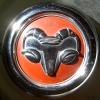-
Posts
6,967 -
Joined
-
Last visited
-
Days Won
72
Content Type
Links Directory
Profiles
Articles
Forums
Downloads
Store
Gallery
Blogs
Events
Everything posted by JBNeal
-
possible answer
-
Flatheads left the plant with aluminum paint but that wasn't meant to be there forever...many equipment manufacturers assembled components then applied paint to the whole thing, wiring included sometimes, then added parts from other sources that may have been painted another color (like black). Flatheads left the engine factory sometimes in bulk on flatbed trucks or in crates, so not all of the engine components were added to limit any damage in transit. My '49 has some aluminum paint visible on the intake manifold, but the thermal expansion of the exhaust manifold just let's the paint flake off. There are special coatings available so that you can give your engine compartment a more attractive appearance, some folks go plain to keep the manifolds from rusting, others go fancy to accentuate them manifolds...choose wisely
- 13 replies
-
- engine accessories
- engine color
-
(and 3 more)
Tagged with:
-

Correct Color for my Engine and 12 volts
JBNeal replied to Chiefrocka's topic in Mopar Flathead Truck Forum
additional information - Engine Color -
If it is too loose after installation, tap the end on the horn of an anvil to open up the diameter...or use a large crescent wrench
-

What new features are coming summer 2017...
JBNeal replied to P15-D24's topic in Forum Announcements And Feedback
Reactions and Editor Uploading Improvements look interesting -
My '48 has bound up, I'm thinking that it spun a bearing...it's like a wedge between the crank and rod since the alignment tab may have slipped out of the notch...a few months ago I recalled seeing something when I opened up the engine back in '96, but I didn't realize what I was looking at until reading something about it on the HAMB...better late than never
-
Pusher fans are usually used to address packaging constraints in automotive applications as road debris can really do a number on the blades...puller fans do much better when coupled with a properly formed shroud
-
You could get replacement springs and have them tested for a comparison... I have read that if there is any damage to the spring wire surface, then the springs should be replaced regardless of how much compression force they can withstand. The reasoning was that oxidation from moisture inside the valve chambers (i.e. ambient humidity and condensation), as well as any acidic issues with sludge formations, damages the surface of the spring wire, which can cause weakness in the spring or eventual failure. I recall the surfaces of the springs in the '48 and '49 were not smooth compared with the NORS springs I found on eBay several years ago, and made a mental note to address that. As for the shims, I think they are used to keep the valves from "floating" above the tappets at high rpms by assisting in adding more compression to the spring, a kind of pre-load for lack of a better term
-
To avoid another argument about engine oil, I will point out that I did some reading, and I weighed the risks and benefits of going to 10W30. I operate my flatheads in light duty use: once or twice a week, with mostly the weight of the truck as its load, and at low engine revs. Even if I had a daily driver, I would stick with the 10W30 because it was presumably brought to market to be backwards compatible with its use of detergents and stabilizers. I'm a little confused at the heat exchange argument as the Texas heat makes 10W30 act like straight 30 anyways...therefore, it was cheaper for me to buy 10W30 in bulk since it would act like straight 30 almost year round. If I were to operate my flatheads in heavy duty use, I would probably switch to the 15W40 that I use in my Cummins, which is the other oil grade that I buy in bulk. But I have the Cummins as the workhorse so that I can use the flatheads for fun, so it is cheaper for me to run 10W30 than 15W40. No matter which grade used, keeping the levels nominal and changing as required are paramount
-
I ran straight 30 for years in the Texas heat, then did some reading and switched to 10W30 cuz I used that weight in a lot of other machines I was running and was buying it in bulk anyway. There was no apparent change in pressure and I always had some on the shelf
-
When it comes to the information on the internet, I have learned to take it all with a grain of salt. Basic information can be erroneous, mix in some opinions and then comes the conflicts. I have recently dealt with Echo, Stihl, Subaru, John Deere and New Holland parts guys working on several pieces of not-new equipment and confusion led to exasperation with them because what I needed did not match their catalogs...I had to rely on my diplomacy skills to keep them motivated to help me out because they wanted to throw their hands up and walk away, and eventually we determined that in each case there were errors in their online catalogs that we were able to correct on our end to get the right parts to get this equipment back in the field. These parts guys are just like most mechanics in that they are helpful up to a point, then their less-than-outgoing personalities begin to re-emerge and they start to shut down in some form of frustration. They aren't bad ppl, but most guys fall into this category in that continued questioning is an implied second-guessing of abilities that can be insulting to one's machismo. Some things just are not up for debate, it either works or does not work...that sort of thing. One of the most important things I have learned from using the internets is that arguing online is a complete waste of time: ppl are bull-headed and will not change their minds, no matter how well-crafted the attempted persuasion or the presentation of facts. So whenever I spot someone using inflammatory or argumentative language, I spend my time doing something else, but responding to the bait ain't gonna be it
-
I believe the install height has to do with when the spring is seated against the block and valve keeper lock disk with the keepers in place and with the valve seated in the block, which sounds like the 1-3/8" dimension. And I agree, new battery cables yield surprisingly good results after dealing with the headache of high impedance batt.cables
-
My opinion is that carbs were unpainted from the factory as it was not needed since the carbs were made of an alloy that did not oxidize like the cast iron adapters they bolted to on cast iron manifolds. These alloys varied depending on model and year I suppose, with varying alloys of aluminum and zinc. If you look in the fuel chamber and down the throat, you will probably see the original metal color, with greys having higher aluminum content and yellers having more zinc content. Since practically all carbs of this era seeped a little, the metal stained over time to vary the exterior finish hues. But the carb bodies are metal nonetheless, so an adequate (etching) primer coat with any top coat should yield decent aesthetic attributes
- 13 replies
-
- 1
-

-
- engine accessories
- engine color
-
(and 3 more)
Tagged with:
-
I recall that the engine color specified was aluminum as it has a more dull finish than silver and less grey than argent...at one time Bernbaum's sold aluminum engine paint but that's been awhile since I've seen that...for the parking brke, I have seen nothing but black handled and black buttoned units; however I have seen aluminum and black floor shifts so do what ya find aestheticly pleasing additional information - Engine Color
- 13 replies
-
- engine accessories
- engine color
-
(and 3 more)
Tagged with:
-

6th Annual "International Work On Your Truck Day"...
JBNeal replied to 48Dodger's topic in Mopar Flathead Truck Forum
On my lunch break, I opened and closed the doors on the '48...they didn't squeak creak or groan, so the MMO that I used last fall is still a-workin' -
If you've got the space, how'bout using the original fuel filler neck in the cab and plumb it under the bed to the rear...that also increases your fuel capacity for long trips
-

6th Annual "International Work On Your Truck Day"...
JBNeal replied to 48Dodger's topic in Mopar Flathead Truck Forum
If ya had your picture taken while waiting by the mailbox, that counts as working on your truck in my book -
partial PCV conversion
-
ya know I've seen my share of industrial safety videos, and I reckon ya got yourself a "do this, not this" comparison...ppl learn from that kinda stuff
-
I have lost the Polaroids, but I pulled the oil pan from my '49 and made a softball-sized ball with all of the sludge I had scraped out...I also knocked out the freeze plugs and sludge was in there too, enough to completely cover the lower holes and could easily be see thru the upper holes...had to fashion a scraper out of a wire coat hanger to get the sludge out of the water jacket behind cyl#6...and yes, there was quite a pile of dirt grease and oil that I scraped off of the engine and transmission; the transmission was so badly covered it looked like a filthy beach ball, and the rear axle differential was almost as bad...once I cleaned them all out and put new seals in, I noticed seepage, and eventually came to realize that the old hard seals had cut small grooves in the mating shaft surfaces that required SKF sleeves...live and learn, I reckon
-
I am glad to hear that FCA is still in the build card business, maybe I'll try again
-
part numbers verified OP needs an adapter bracket first...I am not entirely certain that the rear bracket for the B-1, B-2 and B-3 will work as an adapter for the front of the tank...I think the filler neck and cab opening might dictate where the tank flange aligns with that cross member
-
The last time that I checked, there was a whole section in the Hemmings that listed the diaphragm rebuilding service...I had my distributor rebuilt by Burton L Norton and they rebuilt the vacuum advance, among other things
- 47 replies
-
- 1
-

-
FYI I read somewhere that the hand crank torque should be in the 35-45 ft-lb range...it is possible with the right tool, but ya gotta have a sturdy frame to accomplish this without paying for it the day after
-
Your mounting springs look about as cranked down as the ones I have...I reckon that allows the bolt to wobble a little bit when the frame flexes. The 126" wheelbase frame appears to have the tank mount between cross members, whereas the 116" wheelbase frame mounts the tank to a cross member and a bracket...I learn something new everyday

